人教版初中英语中考英语语法总结
- 格式:doc
- 大小:45.00 KB
- 文档页数:13
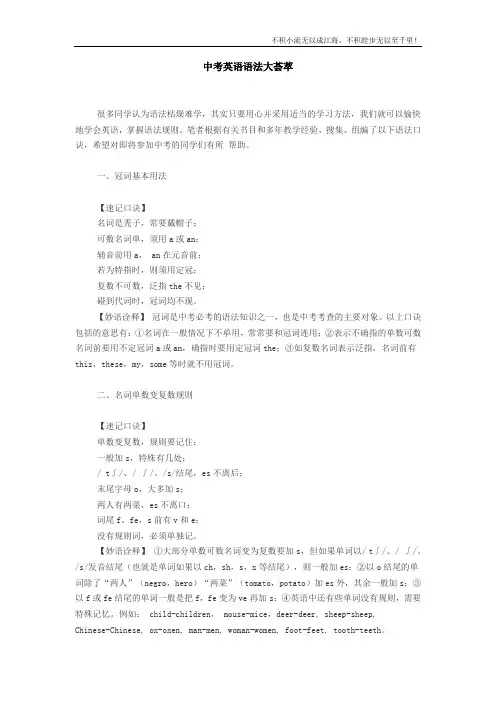
中考英语语法大荟萃很多同学认为语法枯燥难学,其实只要用心并采用适当的学习方法,我们就可以愉快地学会英语,掌握语法规则。
笔者根据有关书目和多年教学经验,搜集、组编了以下语法口诀,希望对即将参加中考的同学们有所帮助。
一、冠词基本用法【速记口诀】名词是秃子,常要戴帽子;可数名词单,须用a或an;辅音前用a, an在元音前;若为特指时,则须用定冠;复数不可数,泛指the不见;碰到代词时,冠词均不现。
【妙语诠释】冠词是中考必考的语法知识之一,也是中考考查的主要对象。
以上口诀包括的意思有:①名词在一般情况下不单用,常常要和冠词连用;②表示不确指的单数可数名词前要用不定冠词a或an,确指时要用定冠词the;③如复数名词表示泛指,名词前有this,these,my,some等时就不用冠词。
二、名词单数变复数规则【速记口诀】单数变复数,规则要记住;一般加s,特殊有几处;/ t∫/、/ ∫/、/s/结尾,es不离后;末尾字母o,大多加s;两人有两菜,es不离口;词尾f、fe,s前有v和e;没有规则词,必须单独记。
【妙语诠释】①大部分单数可数名词变为复数要加s,但如果单词以/ t∫/、/ ∫/、/s/发音结尾(也就是单词如果以ch,sh,s,x等结尾),则一般加es;②以o结尾的单词除了“两人”(negro,hero)“两菜”(tomato,potato)加es外,其余一般加s;③以f或fe结尾的单词一般是把f,fe变为ve再加s;④英语中还有些单词没有规则,需要特殊记忆。
例如: child-children, mouse-mice,deer-deer, sheep-sheep,Chinese-Chinese, ox-oxen, man-men, woman-women, foot-feet, tooth-teeth。
三、名词所有格用法【速记口诀】名词所有格,表物是“谁的”;若为生命词,加“’s”即可行,词尾有s,仅把逗号择;并列名词后,各自和共有,前者分别加,后者最后加;若为无生命词,of所有格,前后须倒置,此是硬规则。
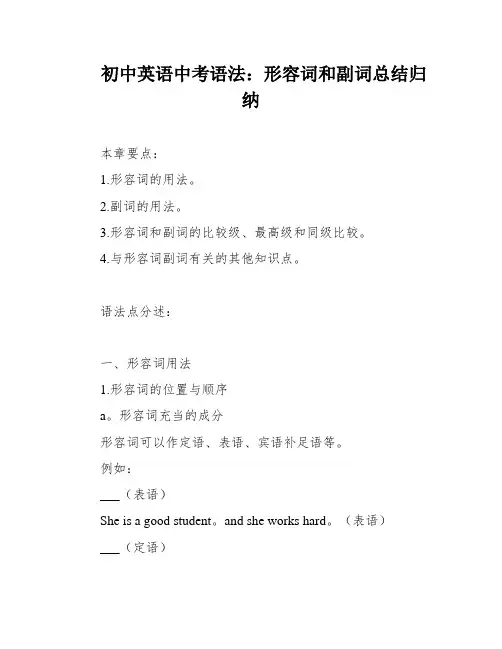
初中英语中考语法:形容词和副词总结归纳本章要点:1.形容词的用法。
2.副词的用法。
3.形容词和副词的比较级、最高级和同级比较。
4.与形容词副词有关的其他知识点。
语法点分述:一、形容词用法1.形容词的位置与顺序a。
形容词充当的成分形容词可以作定语、表语、宾语补足语等。
例如:___(表语)She is a good student。
and she works hard。
(表语)___(定语)b。
形容词的顺序形容词的顺序为:限定词、外观(大小、长短和高低)、形状、年龄(新旧)、材料、颜色、国籍。
主观在前,客观在后。
例如:一件昂贵的俄国产的棕色皮大衣一条可爱的丹麦的小美人鱼One day they crossed the old Chinese ___.一根爷爷传给我的长长的棕色的波斯木纹手杖a。
特殊形容词的位置特殊形容词修饰不定代词时放在后面。
例如:I had ___ that there would be nothing us because it was fairly common for an old man to catch illness。
(fairly为特殊形容词)well、ill等表达健康状况、情感类形容词只作表语,不做定语。
例如:He is an ill man.(定语)He is ___.(表语)二、副词用法副词可以修饰动词、形容词、副词和整个句子。
例如:___(修饰动词)___(修饰形容词)___(修饰副词)Fortunately。
___(修饰整个句子)三、形容词和副词的比较级、最高级和同级比较形容词和副词的比较级通常在词尾加-er,最高级通常在词尾加-est。
例如:fast。
faster。
fastestbeautiful。
more beautiful。
most beautiful同级比较则使用as…as结构。
例如:She is as smart as her sister.四、与形容词副词有关的其他知识点其他知识点包括:形容词的转化、副词的修饰范围等。
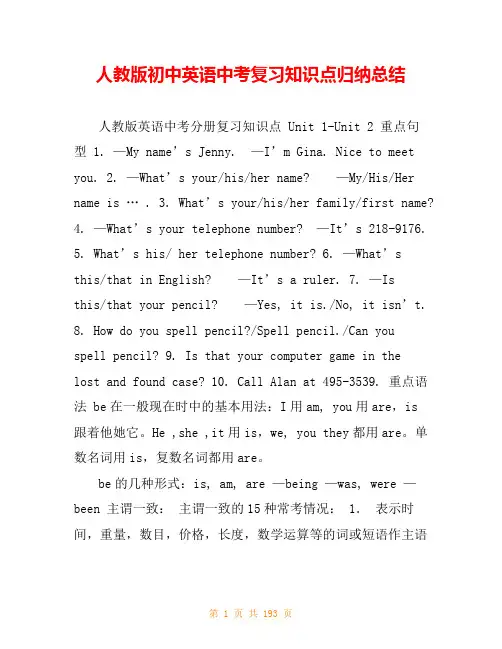
人教版初中英语中考复习知识点归纳总结人教版英语中考分册复习知识点 Unit 1-Unit 2 重点句型 1. —My name’s Jenny. —I’m Gina. Nice to meet you. 2. —What’s your/his/her name? —My/His/Her name is … . 3. What’s your/his/her family/first name?4. —What’s your telephone number? —It’s 218-9176.5. What’s his/ her telephone number?6. —What’sthis/that in English? —It’s a ruler. 7. —Isthis/that your pencil? —Yes, it is./No, it isn’t.8. How do you spell pencil?/Spell pencil./Can youspell pencil? 9. Is that your computer game in thelost and found case? 10. Call Alan at 495-3539. 重点语法 be在一般现在时中的基本用法:I用am, you用are,is跟着他她它。
He ,she ,it用is,we, you they都用are。
单数名词用is,复数名词都用are。
be的几种形式:is, am, are —being —was, were —been 主谓一致:主谓一致的15种常考情况: 1.表示时间,重量,数目,价格,长度,数学运算等的词或短语作主语时,尽管他们是复数形式,但如果把这些复数形式的词或短语看作是一个整体,谓语动词用单数形式。
Two months is quite a long time. Twenty dollars is enough. 2.动词不定式,动名词,从句或不可数名词作主语时,谓语动词用单数。
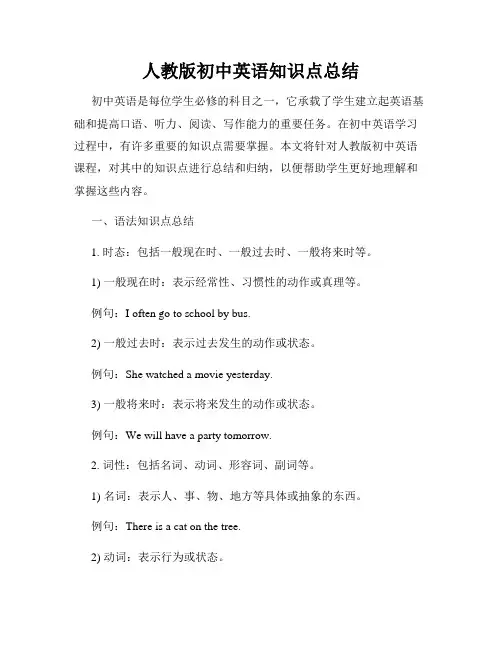
人教版初中英语知识点总结初中英语是每位学生必修的科目之一,它承载了学生建立起英语基础和提高口语、听力、阅读、写作能力的重要任务。
在初中英语学习过程中,有许多重要的知识点需要掌握。
本文将针对人教版初中英语课程,对其中的知识点进行总结和归纳,以便帮助学生更好地理解和掌握这些内容。
一、语法知识点总结1. 时态:包括一般现在时、一般过去时、一般将来时等。
1) 一般现在时:表示经常性、习惯性的动作或真理等。
例句:I often go to school by bus.2) 一般过去时:表示过去发生的动作或状态。
例句:She watched a movie yesterday.3) 一般将来时:表示将来发生的动作或状态。
例句:We will have a party tomorrow.2. 词性:包括名词、动词、形容词、副词等。
1) 名词:表示人、事、物、地方等具体或抽象的东西。
例句:There is a cat on the tree.2) 动词:表示行为或状态。
例句:She is singing a song.3) 形容词:修饰名词或代词,表示人或事物的特征。
例句:He is a tall boy.4) 副词:修饰动词、形容词、副词等,表示程度、方式、时间等。
例句:She runs very fast.3. 句型:包括陈述句、疑问句、祈使句、感叹句等。
1) 陈述句:陈述一个事实或提供信息。
例句:I like swimming.2) 疑问句:用于提问。
例句:Do you like chocolate?3) 祈使句:表示请求、建议、命令等。
例句:Please close the door.4) 感叹句:用于表示惊讶、喜悦、气愤等感叹的情绪。
例句:What a beautiful flower!二、听力技巧总结初中英语听力考试是学生考试中的重点之一。
为了取得好成绩,学生需要掌握一些听力技巧。
1. 提前预测:在听力录音开始之前,快速读题,提前预测答案的类型和可能的内容。
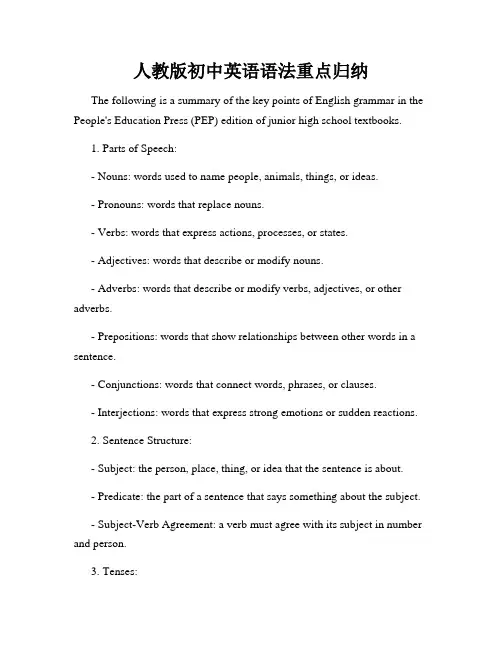
人教版初中英语语法重点归纳The following is a summary of the key points of English grammar in the People's Education Press (PEP) edition of junior high school textbooks.1. Parts of Speech:- Nouns: words used to name people, animals, things, or ideas.- Pronouns: words that replace nouns.- Verbs: words that express actions, processes, or states.- Adjectives: words that describe or modify nouns.- Adverbs: words that describe or modify verbs, adjectives, or other adverbs.- Prepositions: words that show relationships between other words in a sentence.- Conjunctions: words that connect words, phrases, or clauses.- Interjections: words that express strong emotions or sudden reactions.2. Sentence Structure:- Subject: the person, place, thing, or idea that the sentence is about.- Predicate: the part of a sentence that says something about the subject.- Subject-Verb Agreement: a verb must agree with its subject in number and person.3. Tenses:- Present Simple: used to talk about regular habits, general truths, and permanent situations.- Present Continuous: used to talk about actions happening at the moment of speaking or around now.- Past Simple: used to talk about completed actions in the past.- Past Continuous: used to talk about actions in progress at a specific time in the past.- Future Simple: used to talk about future actions, predictions, or offers.- Future Continuous: used to talk about ongoing actions in the future.- Present Perfect: used to talk about past actions with a connection to the present.- Present Perfect Continuous: used to talk about ongoing actions that started in the past and continue to the present.4. Sentence Patterns:- Subject + Verb: the most basic sentence pattern.- Subject + Verb + Object: the pattern for sentences with transitive verbs.- Subject + Verb + Complement: used with linking verbs to describe or rename the subject.- Subject + Verb + Indirect Object + Direct Object: used to show to whom or for whom an action is done.- Subject + Verb + Prepositional Phrase: used to show location or time.5. Agreement and Disagreement:- Auxiliary Verbs: used to form questions, negatives, agreement, and disagreement.- Modals: used to express possibility, probability, permission, necessity, advice, ability, and past ability.- Indirect Speech: used to report what someone said without quoting their exact words.6. Conditionals:- Zero Conditional: used for general truths and scientific facts.- First Conditional: used for possible situations in the future.- Second Conditional: used for hypothetical or unlikely situations in the present or future.- Third Conditional: used for situations that did not happen in the past.In summary, the PEP edition of junior high school English textbooks covers various grammar topics important for language learning. By understanding the parts of speech, sentence structures, tenses, sentence patterns, agreement and disagreement, conditionals, and other grammar rules, students can enhance their language skills and effectively communicate in English.。
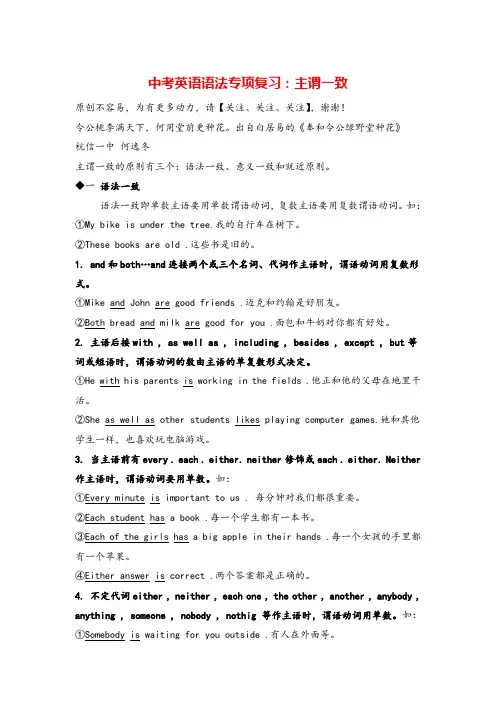
中考英语语法专项复习:主谓一致原创不容易,为有更多动力,请【关注、关注、关注】,谢谢!令公桃李满天下,何用堂前更种花。
出自白居易的《奉和令公绿野堂种花》杭信一中何逸冬主谓一致的原则有三个:语法一致、意义一致和就近原则。
◆一语法一致语法一致即单数主语要用单数谓语动词,复数主语要用复数谓语动词。
如:①My bike is under the tree.我的自行车在树下。
②These books are old .这些书是旧的。
1. and和both…and连接两个或三个名词、代词作主语时,谓语动词用复数形式。
①Mike and John are good friends .迈克和约翰是好朋友。
②Both bread and milk are good for you .面包和牛奶对你都有好处。
2. 主语后接with , as well as , including , besides , except , but等词或短语时,谓语动词的数由主语的单复数形式决定。
①He with his parents is working in the fields .他正和他的父母在地里干活。
②She as well as other students likes playing computer games.她和其他学生一样,也喜欢玩电脑游戏。
3. 当主语前有every . each . either. neither修饰或each . either. Neither 作主语时,谓语动词要用单数。
如:①Every minute is important to us . 每分钟对我们都很重要。
②Each student has a book .每一个学生都有一本书。
③Each of the girls has a big apple in their hands .每一个女孩的手里都有一个苹果。
④Either answer is correct .两个答案都是正确的。
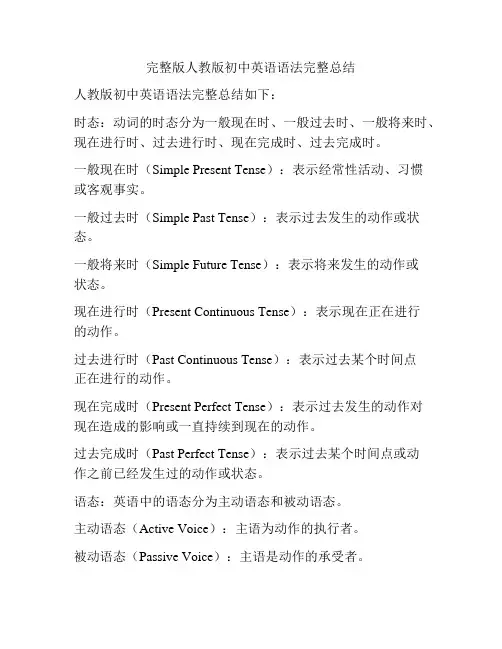
完整版人教版初中英语语法完整总结人教版初中英语语法完整总结如下:时态:动词的时态分为一般现在时、一般过去时、一般将来时、现在进行时、过去进行时、现在完成时、过去完成时。
一般现在时(Simple Present Tense):表示经常性活动、习惯或客观事实。
一般过去时(Simple Past Tense):表示过去发生的动作或状态。
一般将来时(Simple Future Tense):表示将来发生的动作或状态。
现在进行时(Present Continuous Tense):表示现在正在进行的动作。
过去进行时(Past Continuous Tense):表示过去某个时间点正在进行的动作。
现在完成时(Present Perfect Tense):表示过去发生的动作对现在造成的影响或一直持续到现在的动作。
过去完成时(Past Perfect Tense):表示过去某个时间点或动作之前已经发生过的动作或状态。
语态:英语中的语态分为主动语态和被动语态。
主动语态(Active Voice):主语为动作的执行者。
被动语态(Passive Voice):主语是动作的承受者。
名词:名词主要负责表示事物的名称和概念。
可数名词(Countable Nouns):表示可以计数的名词,可有单数和复数形式。
不可数名词(Uncountable Nouns):表示不可数的名词,只有单数形式。
复数名词(Plural Nouns):表示复数的名词,可通过在名词后加-s或-es形成。
冠词:冠词主要用于限定名词。
不定冠词(Indefinite Article):a/an,表示泛指。
定冠词(Definite Article):the,表示特指。
形容词:形容词用于修饰名词,表示事物的性质、特征或状态。
比较级与最高级:形容词有比较级和最高级形式,用于比较两个或多个事物的程度。
比较级(Comparative):表示两者之间的比较。
最高级(Superlative):表示三者或以上之间的比较。
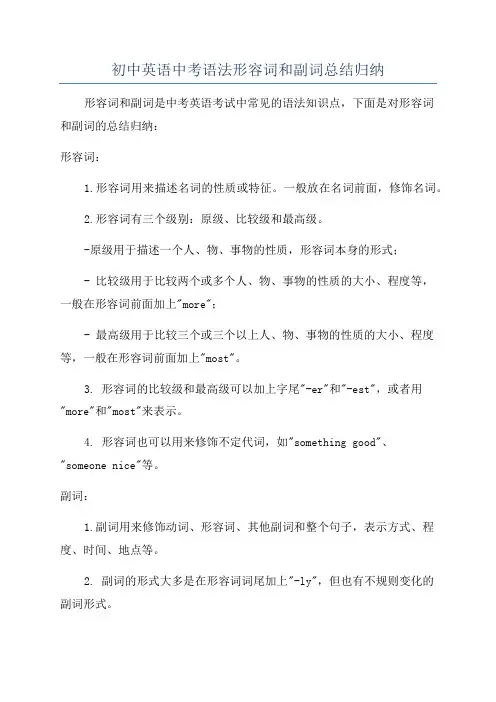
初中英语中考语法形容词和副词总结归纳形容词和副词是中考英语考试中常见的语法知识点,下面是对形容词和副词的总结归纳:形容词:1.形容词用来描述名词的性质或特征。
一般放在名词前面,修饰名词。
2.形容词有三个级别:原级、比较级和最高级。
-原级用于描述一个人、物、事物的性质,形容词本身的形式;- 比较级用于比较两个或多个人、物、事物的性质的大小、程度等,一般在形容词前面加上"more";- 最高级用于比较三个或三个以上人、物、事物的性质的大小、程度等,一般在形容词前面加上"most"。
3. 形容词的比较级和最高级可以加上字尾"-er"和"-est",或者用"more"和"most"来表示。
4. 形容词也可以用来修饰不定代词,如"something good"、"someone nice"等。
副词:1.副词用来修饰动词、形容词、其他副词和整个句子,表示方式、程度、时间、地点等。
2. 副词的形式大多是在形容词词尾加上"-ly",但也有不规则变化的副词形式。
3. 副词有原级和比较级,形式和形容词的比较级一样,可以在副词前面加上"more"来表示。
注意事项:1.形容词和副词的比较级和最高级要根据词的性质和词尾变化,不是所有形容词和副词都可以直接加上字尾来表示比较级和最高级。
2.形容词和副词的用法、位置和修饰的词性有一定的规律,需要具体问题具体分析。
以上是对初中英语中考语法中形容词和副词的总结归纳,希望能够帮助到你。
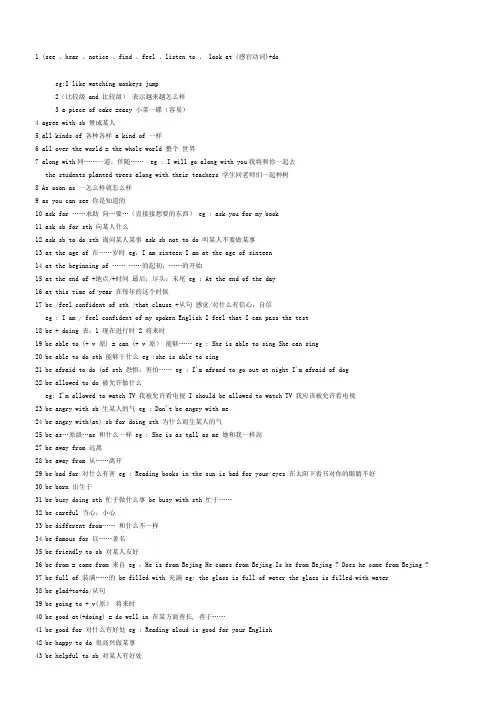
1 (see 、hear 、notice 、find 、feel 、listen to 、 look at (感官动词)+doeg:I like watching monkeys jump2(比较级 and 比较级)表示越来越怎么样3 a piece of cake =easy 小菜一碟(容易)4 agree with sb 赞成某人5 all kinds of 各种各样 a kind of 一样6 all over the world = the whole world 整个世界7 along with同……一道,伴随…… eg : I will go along with you我将和你一起去the students planted trees along with their teachers 学生同老师们一起种树8 As soon as 一怎么样就怎么样9 as you can see 你是知道的10 ask for ……求助向…要…(直接接想要的东西) eg : ask you for my book11 ask sb for sth 向某人什么12 ask sb to do sth 询问某人某事 ask sb not to do 叫某人不要做某事13 at the age of 在……岁时 eg:I am sixteen I am at the age of sixteen14 at the beginning of …… ……的起初;……的开始15 at the end of +地点/+时间最后;尽头;末尾 eg : At the end of the day16 at this time of year 在每年的这个时候17 be /feel confident of sth /that clause +从句感觉/对什么有信心,自信eg : I am / feel confident of my spoken English I feel that I can pass the test18 be + doing 表:1 现在进行时 2 将来时19 be able to (+ v 原) = can (+ v 原)能够…… eg : She is able to sing She can s ing20 be able to do sth 能够干什么 eg :she is able to sing21 be afraid to do (of sth 恐惧,害怕…… eg : I'm afraed to go out at night I'm afraid of dog22 be allowed to do 被允许做什么eg: I'm allowed to watch TV 我被允许看电视 I should be allowed to watch TV 我应该被允许看电视23 be angry with sb 生某人的气 eg : Don't be angry with me24 be angry with(at) sb for doing sth 为什么而生某人的气25 be as…原级…as 和什么一样 eg : She is as tall as me 她和我一样高27 be away from 远离28 be away from 从……离开29 be bad for 对什么有害 eg : Reading books in the sun is bad for your eyes 在太阳下看书对你的眼睛不好30 be born 出生于31 be busy doing sth 忙于做什么事 be busy with sth 忙于……32 be careful 当心;小心33 be different from…… 和什么不一样34 be famous for 以……著名35 be friendly to sb 对某人友好36 be from = come from 来自 eg :He is from Bejing He comes from Bejing Is he from Bejing ? Does he come from Bejing ?37 be full of 装满……的 be filled with 充满 eg: the glass is full of water the glass is filled with water38 be glad+to+do/从句39 be going to + v(原)将来时40 be good at(+doing) = do well in 在某方面善长, 善于……41 be good for 对什么有好处 eg : Reading aloud is good for your English42 be happy to do 很高兴做某事43 be helpful to sb 对某人有好处eg : Reading aloud is helpful to you 大声朗读对你有好处Exercising is helpful to your bady 锻炼对你的身体有好处44 be in good health 身体健康45 be in trouble 处于困难中 eg : She is in trouble They are in tronble46 be interested in 对某方面感兴趣47 be late for = come late to 迟到 eg: Be late for class 上课迟到48 be like 像…… eg : I'm like my mother49 be mad at 生某人的气50 be made from 由……制成(制成以后看不见原材料)51 be made of 由……制成(制成以后还看得见原材料)52 be not sure 表不确定53 be on a visit to 参观54 be popular with sb 受某人欢迎55 be quiet 安静56 be short for 表**的缩写 eg: 陶 is short for 陶俊杰57 be sick in bed 生病在床58 be sorry to do sth be sorry for sb eg : I am sorry for you59 be sorry to hear that60 be sorry to trouble sb eg : I am sorry to trouble you61 be strict in doing sth 严于做某事 eg : He's strict in obeying noles62 be strict with sb 对某人要求严格 eg: Some students are not strict with them selves 这些学生对自己不严格63 be strict with sb in sth 某方面对某人严格64 be supposed to do 被要求干什么65 be sure 表确定66 be sure of doing sth 对做某事有信心 eg: He is sure of winning I am sure of learning English well67 be sure of sth 对做某事有信心 eg: I'm sure of my head (my teacher 我相信我的大脑(老师)68 be sure that sth 对做某事有信心 eg: I'm suer that he can pass the test 我相信他能通过考试69 be sure to do sth一定会做某事eg: We are sure to pass the test 我们一定会通过这次考试We are sure to learn English well 我们一定能学好英语70 be terrified of + 名/动doing 害怕……71 be terrified to do sth 害怕做某事72 be t he same as … 和什么一样73 be used to doing sth 习惯做某事eg: My father is used to getting up early 我爸爸习惯早He is used to sleeping in class 他习惯上课睡觉74 be worth doing 值得做什么75 be(feel) afraid to do sth 害怕做某事be afraid of sth 害怕某物 be afraid that 丛句76 because+句子 because of +短语eg : He was late because he had a headache He was late because of his headache77 begin to do = start to do 开始做某事start…with…=begin…with… 以什么开始什么eg : Let's begin the game with the song I begin to go home78 between…and… 两者之间79 borrow sth from sb 向……借…… lend sth to sb ( lend sb sth 借给……什么东西eg : I borrowed a pen from him he lent a pen to me ( he lent me a pen80 both = the same(as) = not different(from) 表相同81 bother 打扰 bother sb to do stheg : I'm sorry to bother you ,but can you tell me to way to the station我十分道歉打扰你,但是你能告诉我怎么去车站the problem has been bothering me for weeks 这个问题困扰了我几个周了He's bothering me to lend him money82 by the end of 到……为止83 call sb sth eg : We call him old wang84 care 关心 eg : Don't you care about this country's future ?你为什么不关心国家的未来85 catch up with sb 赶上某人86 chat with sb 和某人闲谈 take sb to + 地点带某人去某地87 come in 进88 come over to 过来89 come up with 提出 eg: Can you come up with a good idea 你能想出一个好办法吗?90 communicate with sb 和某人交流91 consider + doing 考虑做什么 eg : Why not consider going to lu zhou 为什么不考虑去泸州?92 dance to 随着……跳舞 eg : She likes dancing to the music 她喜欢随着音乐跳舞93 decide to do sth 决定做某事94 do a survey of 做某方面的调查95 do better in 在……方面做得更好96 do wrong 做错97 Don't forget to do sth 不要忘了做某事98 Don't mind +doing /从句 /名词不要介意……99 each +名(单)每一个…eg : Each student has many books 每一个学生都有一些书101 enjoy +doing喜欢102 escape from 从……逃跑eg: The prisoners have escaped from the prison犯人从监狱里逃跑出来103 expect to do sth 期待做某事104 fall down 摔下来 fall off 从哪摔下来105 fall in love with sb /sth 爱上什么106 far from 离某地远 eg : The school is far from my home 107 find +it +adj +to do 发现做某事怎么样108 find sb/sth +adj 发现什么怎么样 eg : I find the book interesting109 finish 完成+doing(名词)110 fit to sb = be fit for sb 适合某人111 forget to do 没有做而忘了 forget doing 做了而又忘了eg: Don't forget to go home I forget closing door 112 from…to… 从某某到某某 eg: From me for her113 get /have sth down 做完,被(别人)做…eg: I have my hair cut 我理了发(头发被剪了)Tom got his bad tooth pulled out 汤母把他的坏牙拔掉了(被牙医拔掉了)114 get a part-time job= find a part-time job115 get along well with sb = get on well with sb 与某人相处得好116 get along with sb = get on with sb 与某人相处117 get ready for = be ready for为什么而准备eg : I get ready for math I am ready for math118 get sb in to trouble 给某人麻119 get sb to do sth120 get…from… 从某处得到某物121 give a talk 做报告 eg: He is give a tall122 give sth to sb give sb sth 给某人某物123 go fish 钓鱼 go swimming 游泳124 go on to do 去做下一件事 go on doing 继续做这件事125 go out away from go out of126 go to school 上学(用于专业的)go to the school 去学校(不一定是上学)127 good way to 好方法128 hate to do 讨厌没做过的事 hate doing 讨厌做过的事129 have a party for sb 举办谁的晚会130 have a talk 听报告谈一谈131 have been doing 现在完成进行时 eg : You have been talking You have been sleeping since132 have been to …( 地方)……去过某过地方have gone to …(地方)去了某地还没回来133 have fun +doing 玩得高兴134 have sth to do 有什么事要做eg: I have a lot of homework to do 我有很多家庭作业要做 I have nothing to do 我没什么事情做135 have to do sth 必须做某事136 have trouble (problem) (in) doing sth 做什么事情有麻烦137 have…time +doing138 have…(时间)…off 放……假 eg: I have month off 我请一个月得假139 hear sb +do/doing 听见某人做某事/正在做某事140 help a lot 很大用处141 help sb with sth \one's sth 帮助某人某事(某方面) help sb (to) do sth 帮助某人做某事142 hope to do sth 希望做某事143 How about(+doing) = What about(+doing)144 how do you like = what do you think of 你对什么的看法145 if : 是否=wethereg: I don't know if (wether) I should go to the party 我不知道我是否应该去参加晚会He don't know if (wether) we will arrive on time tomorrow morning 他不知道我们明天早上是否能准时到达146 if :如果,假如(全部接一般时态)+条件语态从句eg: I'll go to LuZhou if it does't rain 假如明天不下雨,我就去泸州If they change the plan they will let me know 假如他们要改变计划,他们会让我知道的I'll go to England ,if I have enough money next year 如果我明年由足够的钱,我就要去英国147 in one's opinion = sb think 某人认为148 in some ways 在某些方面149 in the end = finally(adv) 最后150 in the north of… 什么在什么的北方(north 北 sowth 南 west 西 east 东)151 in the sun 在太阳下152 increase 增加eg : They've increased the prece of petrol by 3% 他们把石油价增加了3%the population has increased from 12 million ten years ago to 18 million now153 instead of +(名)代替eg: I'd like an apple instead of a pear 我想要苹果,而不要梨子I like English instead of math 我喜欢英语而不喜欢数学154 introduce sb to sb 介绍某人给某人 introduce oneself 自我介绍155 invite sb to do sth 邀请某人做某事156 It takes sb sometime to do sth 做某人花掉某人多少时间eg : It took me 5 minutes to do my homework It takes me half an hour to cook157 It's +adj +for sb to do sth 对某人来说做某事怎么样158 It's +adj +to do 做某事怎么样159 It's +adj for sb 对于某人来说怎么样 It's +adj of sb 对某人来说太怎么样160 It's +adj(for sb) to do(对某人来说)做某事怎么样 It's +adj of sb to do sth 对某人来说做某事太怎么样eg : It's nice of you to help me with my English161 It's a good idea for sb to do sth 对…… 来说是个好主意162 It's important to sb 对某人来说很重要 eg: It's important to me163 It's time to do sth It's time for sth 到了该去做某事的时间eg : It's time to have class It's time for class 该去上课了164 join = take part in 参加165 just now 刚才166 keep +sb /sth +adj /介词短语让什么保持什么样?167 keep out 不让…… 进入168 keep sb adj 让……保持…… eg: I want to keep my mother hap py keep healthy 保持健康169 key to +名词表示:某物的钥匙或某题的答案170 key to… anser to … key 可以是答题或钥匙171 laugh at… 取笑…… eg : Don't langh at others We langhed at the joke172 learn by oneslfe 自学173 learn from sb 向某人学习 eg: We should learn from Lei Feng174 learn to do sth 学做某事175 let sb do sth 让某人做某事176 Let sb down 让某人失望 eg : We shouldn't let our farents down 我们不应该让我们的父母失望177 live from :离某地远178 live in +大地方 /at +小地方居住在某地 eg: I live in LuZhou She lives at XuanTan179 look after = take care of 照顾照看180 lose one's way 谁迷路 eg : Lose your way 你迷路181 make a decision to do sth 决定做某事182 make friends with sb 和谁成为朋友 eg : I want to make friends with you183 make it early 把时间定的早一点184 make on exhibition of oneself 让某人出洋相185 make sb /n +n 使什么成为什么 eg : I made her my step moller I made you my wife186 make sb /sth +adj 使某人(某物)怎么样 eg : You must made your bed clean187 make sb /sth adj 使某人/某物怎么样188 make sb do sth 让某人做某事 eg : I made him write 我以前让他写189 make up be made up of (被动语态)由……组成190 make…difference to…191 mind sb to do mind one's doing 介意……做什么192 most +名 most of +代193 much too +形容词194 must be 一定195 need +名词196 need sb do sth 需要某人做某事197 need to do (实义动词) need do (情态动词)198 no /neithr of hate to do no /neithr of hate doing199 no +名词200 not anymore = no more 再也不…… eg: He didn't cry any more He cried no more 他再也不哭201 not… (形、副)at all eg: He's not tall at all she doesn't junp far at all202 not…at all 一点都不203 not…either 表否定,也不 eg : I don't japanse either I don't have sister, either 我也没有姐姐204 not…until 直到……才……eg: I didn't sleep until my mother came back The child didn't stop crying until I give her sugar205 offer / provide sb with sth 给某人提供206 offer sb sth ( offer sth to sb 提供什么东西给某人 eg : I offer you water (I offer water to you 我给你提供水207 on one's way to… 在谁去那的路上208 on the one hand 一方面 on the other hand 另一方面209 on the phone = over the phone 用电话交谈210 on time 准时 in time 及时211 one day =some day =someday 一天,有一天212 one of +可数名词的复数形式213 one to another 一个到另一个214 over and over agin 一遍又一遍的 eg : He cleaned the floor over and over agin215 part-time job 兼职工作 fall-time job 全职工作216 pay for… 付……钱 pay the bill 开钱,付钱217 please +do218 please help yourself219 pleased with sb220 pool into = pore into221 practice +doing 练习做某事222 prefer sth to sth 相对……更喜欢…… eg : I prefer physics to chemisty 在物理和化学中,我更喜欢物理prefer doing to sth 更喜欢去做…不愿意去做… eg: He prefers riding a bike to diving 他更喜欢骑自行车,不开小车prefer to do sth rather than do sth 宁愿做…也不愿 eg: My unde prefers to buy a now car rather than repaiv the used one 我叔叔更喜欢买新的车,也不去修旧车prefer sb not to do sth 更愿意… eg: I prefer her not to come 我不喜欢她不来223 pretend to do sth 装着去做什么 pretend that 从句eg : The two cheats pretended to be working very hard 这两个骗子装着努力工作He pretended that he did not know the answer 他装着不知道答案224 rather…than 宁可……也不……eg : I would rather be a doctor than a teacher 我愿肯当医生,也不当老师He likes dogs rather than cats 他喜欢狗,不喜欢猫225 regard…as 把……当作……eg: Please give my best regards to your family 请带我向你的家人我最好的问候I regard you as my friend 我把你当作我的朋友He shows little regard for others 他不爱关心别人226 remid sb about sth 提醒某人什么事 remid sb to do sth 提醒某人做某事eg : he remids me about cooking (he remids me to cook 他提醒我做饭227 remid sb of sth 使某人想起什么eg : the pictures remind me of my school days 这照片使我想起了我的学校the words that (which) the teacher talke to remind me of my mother228 return sth to sb 还什么东西给某人229 say to oneself 对自己说230 say to sb 对某人说231 sb spend somemoney on sth 花了多少钱在某事上232 sb spend sometime with sb 花了多少时间陪谁233 sb spend sometime(in) doing sth 花了多少时间做某事234 sb with sb +is sb and sb +are235 see sb do 看见某人做过某事 see sb doing 看见某人正在做某事236 seem to do/be +adj 显得怎么样 eg : You seem to be tired You seem to be happy237 send +sb sth 送给某人某物238 send…to…把什么寄到哪里去?239 shock 使……震惊 eg : Oh , It's only you ! You give me a shock 啊,是你呀!吓我一跳240 show sb sth 向某人展示某物 eg : I show her the book.241 show sb sth = show sth to sb 拿什么东西给某人看 eg: Show me your pen Show your pen to me242 show sth to sb 向某人展示某物 eg : I show the book to her.243 some…others… 一些……另一些……244 start…with… 从……开始begin…with… 从……开始245 stay away from 远离……eg : We're told to stay away from the animals whe visiting the zoo 当我们参观zoo 时,我们要远离动物If you want to lose weight you'd better stay auay from the sweet food 徒工你想减肥,你最好远离甜食246 stop doing 停下正在做的事247 stop sb from doing sth 阻止某人做某事248 stop sb(from) doing 阻止某人做某事249 stop to do 停下正在做的事去做下一件事250 such +名这样,这种251 suit sb 适合某人252 surprise sb 使某人惊奇 to one's surprise 令某人惊奇253 take classes 上课254 take sb to 把某人带去 eg : I take you to the hospital255 take walks = take a walk = go for a walk 散步256 ①talk to 对谁说eg : I talk to you ② talk with 和谁说 eg : I talk with him③ talk of 谈到eg : we talked of you ④ talk about 谈论关于……257 talk with sb 和某人说话258 teach sb sth 教某人做某事259 tell sb do sth 告诉某人做某事260 tell sb sth tell sb that 丛句 tell sb not to do sth tell a story261 tell sb sth 告诉某人某事262 tell sb to do sth 告诉某人做什么 tell sb not to do sth 告诉某人不要做什么263 tell…from…264 thank you for +doing265 the same +名词(doing)+as……266 the same…(名)…as as…(adj adv)…as 相同267 the way to do sth = the way of doing st做某方面的方法the way to +地方去哪的路eg:Do you know the way to learn English Do you know the way of learning English268 the way to…(地点)到哪的269 too…to… 太怎样而不能……adj +enough to 足够…能… so…that +丛句eg: He is too young to go to school = He is so young that he can't go to schoolHe is old enough to go to school = He is so old that he can go to school270 transalte ……into…… 把什么翻译成什么 eg : Trasalte English into chinese271 travel with sb和某人去旅游272 try one's best to do sth尽某人最大的努力去做某事eg: I will try my best to learn English well 273 try to do sth 想干什么,但没成功 try doing sth 想干什么,已经做过了eg :He tried to climb 他想爬上去,但没成功 He tried climbing 他想爬上去,已经做过了274 try…试衣服 have a try 试一下275 turn down 开小←→ turn up 开大276 turn off 关上←→ turn on 打开 open 拆开277 upside down 倒着278 visit to… 参观某个地方279 wait for sb 等某人。
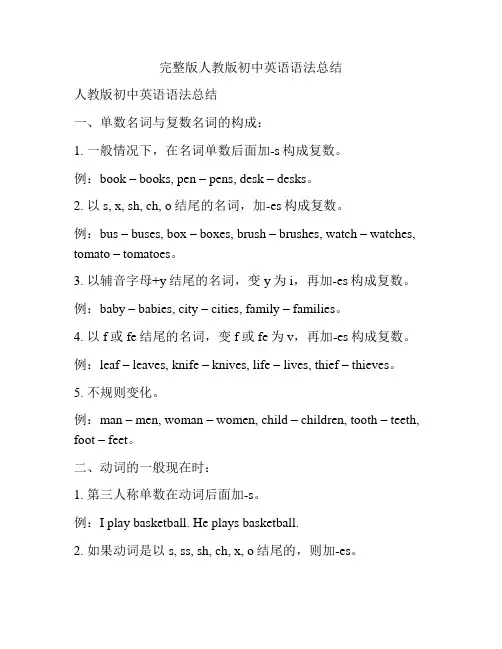
完整版人教版初中英语语法总结人教版初中英语语法总结一、单数名词与复数名词的构成:1. 一般情况下,在名词单数后面加-s构成复数。
例:book – books, pen – pens, desk – desks。
2. 以s, x, sh, ch, o结尾的名词,加-es构成复数。
例:bus – buses, box – boxes, brush – brushes, watch – watches, tomato – tomatoes。
3. 以辅音字母+y结尾的名词,变y为i,再加-es构成复数。
例:baby – babies, city – cities, family – families。
4. 以f或fe结尾的名词,变f或fe为v,再加-es构成复数。
例:leaf – leaves, knife – knives, life – lives, thief – thieves。
5. 不规则变化。
例:man – men, woman – women, child – children, tooth – teeth, foot – feet。
二、动词的一般现在时:1. 第三人称单数在动词后面加-s。
例:I play basketball. He plays basketball.2. 如果动词是以s, ss, sh, ch, x, o结尾的,则加-es。
例:She watches TV. He washes his hands. She teaches English. The boy fixes the computer. He goes to school.3. 否定句和一般疑问句中,助动词do/does放在句首。
例:I don't like swimming. Do you like swimming? She doesn't eat meat. Does he eat meat?4. 表示经常性的动作、习惯性的动作或客观事实的句子,也用一般现在时。
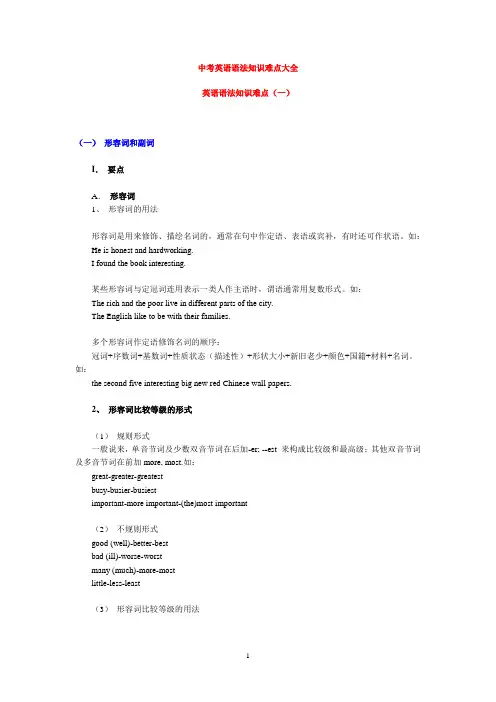
中考英语语法知识难点大全英语语法知识难点(一)(一)形容词和副词I.要点A.形容词1、形容词的用法形容词是用来修饰、描绘名词的,通常在句中作定语、表语或宾补,有时还可作状语。
如:He is honest and hardworking.I found the book interesting.某些形容词与定冠词连用表示一类人作主语时,谓语通常用复数形式。
如:The rich and the poor live in different parts of the city.The English like to be with their families.多个形容词作定语修饰名词的顺序:冠词+序数词+基数词+性质状态(描述性)+形状大小+新旧老少+颜色+国籍+材料+名词。
如:the second five interesting big new red Chinese wall papers.2、形容词比较等级的形式(1)规则形式一般说来,单音节词及少数双音节词在后加-er; --est 来构成比较级和最高级;其他双音节词及多音节词在前加more, most.如:great-greater-greatestbusy-busier-busiestimportant-more important-(the)most important(2)不规则形式good (well)-better-bestbad (ill)-worse-worstmany (much)-more-mostlittle-less-least(3)形容词比较等级的用法①表示两者的比较,用形容词的比较级+than. 如:He is cleverer than the other boys.This one is more beautiful than that one.②表示两者以上的比较,用"the +形容词最高级(+名词)+of(in) …"如:He is the cleverest boy in his class.③表示两者是同等程度,用"as +形容词原级+as". 如:He is as tall as I.I have as many books as you.④越… 越…例如:The more I learn, the happier I am.⑤You can never be too careful. 越小心越好又如:You can never praise the teacher too highly.你怎么赞扬这个老师也不过分。
中考英语语法总结一、祈使句结构1 祈使句结构祈使句用以表达命令,要求,请求,劝告等。
1)祈使句有两种类型,一种是以动词原形开头,在动词原形之前加do (但只限于省略第二人称主语的句子)。
Take this seat.Do be careful.否定结构:Don't move.Don't be late.2)第二种祈使句以let开头。
Let 的反意疑问句a. Let's 包括说话者Let's have another try,shall we / shan't we= Shall we have another tryb. Let us 不包括说话者Let us have another try,will you / won't you= Will you please let us have another try否定结构:Let's not talk of that matter.Let us not talk of that matter.二、感叹句结构感叹句结构感叹句通常有what, how引导,表示赞美、惊叹、喜悦、等感情。
what修饰名词,how 修饰形容词,副词或动词,感叹句结构主要有以下几种:掌握它的搭配,即掌握了感叹句的重点。
How +形容词+ a +名词+ 陈述语序How+形容词或副词+ 陈述语序What +名词+ 陈述语序What+a+形容词+名词+ 陈述语序What+ 形容词+复数名词+ 陈述语序What+ 形容词+不可数名词+ 陈述语序How clever a boy he is!How lovely the baby is!What noise they are making!What a clever boy he is!What wonderful ideas (we have)!What cold weather it is!感叹句的省略形式为:What a clever boy (he is)!典型例题1)___ food you've cooked!A. How a niceB. What a niceC. How niceD. What nice 答案D. 由于How 修饰形容词,副词;what修饰名词。
初中英语语法•名词1.规则名词的复数形式:名词的复数形式,一般在单数形式后面加-s或-es。
现将构成方法表示"某人家""店铺",所有格 后名词省略house Japan ’ s and America ’ s problems, Jane ’ s an bikesd Mary ' s表示共有的所有关系时在最后一词 末加’sJapan and America’ s problems, Jane and Mary's father,my uncle ' sthe doctor ’ s, the barber ’ s, the tailor 以s 结尾的人名所有格加’或者’ 名词在句中表示所有关系的语法形式叫做名词所有格。
所有格分两种:一是名词词尾加 构成,二是由介词 of 加名词构成。
前者多表示有生命的东西,后者多表示无生命的东西表示各自的所有关系时,各名词末尾 均须加’sDicke ns ’ no vels, Charles ’ s job, the Smiths ’冠词分为不定冠词(a, an ),定冠词(the ),和零冠词。
s in dustrys end(3. of 所有格的用法:用于无生命的东西: the legs of the chair, the cover of the book用于有生命的东西,尤其是有较长定语时: ________ t he classrooms of the first-year stude nts用于名词化的词: the struggle of the oppressed二•冠词1) one 可以泛指任何人,也可特指,复数为one& some多用于肯定句,any 多用于疑问句和否定句。
One should lear n to thi nk of others.Have you any bookmarks? No, I don ' t have any bookmarks.I have some questio ns to ask.2) some可用于疑问句中,表示盼望得到肯定的答复,或者表示建议,请求等。
人教版初中英语语法知识点总结归纳一、名词1. 名词概念简介在学习初中英语的过程中,名词是我们最先接触到的语法知识点之一。
名词是指表示人、事物、地方、抽象概念等的词,它是英语中最基本的词类之一。
2. 名词的分类和用法在人教版初中英语教材中,我们学习了可数名词和不可数名词的区别与用法。
可数名词可以用来表示一个或多个单独的事物,而不可数名词则表示不可数的整体或抽象概念。
3. 名词的复数形式当名词为可数名词时,我们需要学习其复数形式的变化规则。
在英语中,名词的复数形式有一定的规律,大部分名词在末尾加上-s即可表示复数形式,但也有一些特殊情况需要特别注意。
二、代词1. 代词的使用范围及特点代词是用来代替名词或其他词类的词,在英语句子中起着非常重要的作用。
在人教版初中英语教材中,我们学习了人称代词、指示代词、不定代词等不同种类的代词,并了解了它们的不同用法和语法规则。
2. 反身代词的用法反身代词是一种特殊的代词,它在句子中的使用具有一定的限制条件。
学习反身代词的用法可以帮助我们更准确地表达自己在交流中的意思。
三、动词1. 动词时态的使用动词时态是初中英语学习中的重要知识点之一。
在人教版初中英语教材中,我们学习了一般现在时、一般过去时、一般将来时等不同的时态,了解了它们的用法和相互转换的规则。
2. 动词的语态除了时态以外,动词的语态也是我们需要掌握的重要知识点之一。
英语中的动词有主动语态和被动语态两种,它们在句子中的使用与汉语有很大的不同,需要我们花费一定的时间和精力去理解和掌握。
四、形容词与副词1. 形容词的修饰作用形容词是用来修饰名词或代词的词,它可以帮助我们更具体地描述一个事物的特征或性质。
学习形容词的用法可以使我们在表达时更加生动、明了。
2. 副词的修饰作用副词是用来修饰动词、形容词、其他副词或整个句子的词,它可以帮助我们更准确地表达时间、地点、原因、目的等概念。
在人教版初中英语教材中,我们学习了副词的不同种类和用法,了解了它们在句子中的位置和作用。
初二英语语法总结1) leave的用法1.“leave+地点"表示“离开某地”.例如:When did you leave Shanghai?你什么时候离开上海的?2.“leave for+地点”表示“动身去某地”。
例如:Next Friday, Alice is leaving for London。
下周五,爱丽斯要去伦敦了。
3。
“leave+地点+for+地点”表示“离开某地去某地”.例如:Why are you leaving Shanghai for Beijing?你为什么要离开上海去北京?2) 情态动词should“应该”学会使用should作为情态动词用,常常表示意外、惊奇、不能理解等,有“竟会”的意思,例如:How should I know? 我怎么知道?Why should you be so late today? 你今天为什么来得这么晚?should有时表示应当做或发生的事,例如:We should help each other。
我们应当互相帮助。
我们在使用时要注意以下几点:1. 用于表示“应该”或“不应该"的概念。
此时常指长辈教导或责备晚辈。
例如:You should be here with clean hands. 你应该把手洗干净了再来。
2。
用于提出意见劝导别人。
例如:You should go to the doctor if you feel ill. 如果你感觉不舒服,你最好去看医生。
3. 用于表示可能性。
should的这一用法是考试中常常出现的考点之一。
例如:We should arrive by supper time。
我们在晚饭前就能到了。
3) What。
?与 Which。
..?1. what 与 which 都是疑问代词,都可以指人或事物,但是what仅用来询问职业。
如:What is your father?你父亲是干什么的?该句相当于:What does your father do?What is your father's job?Which 指代的是特定范围内的某一个人。